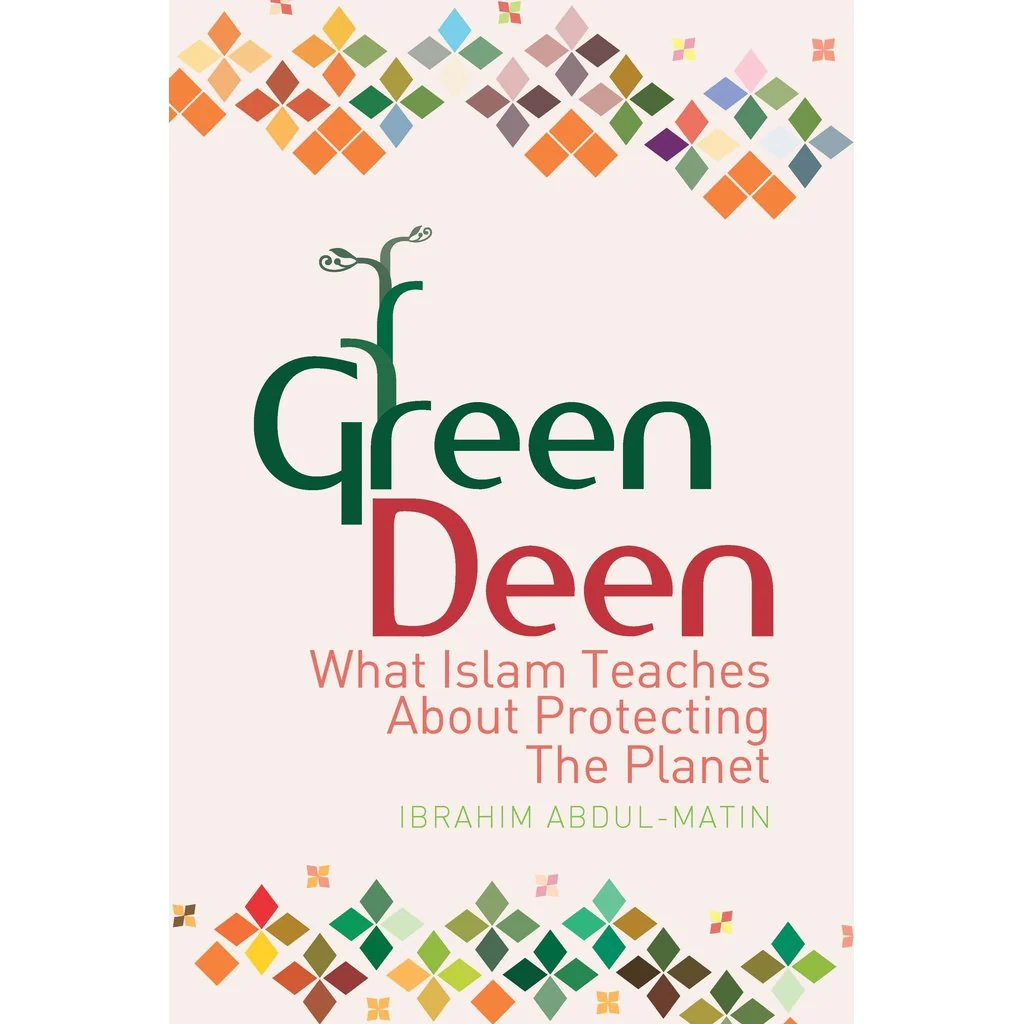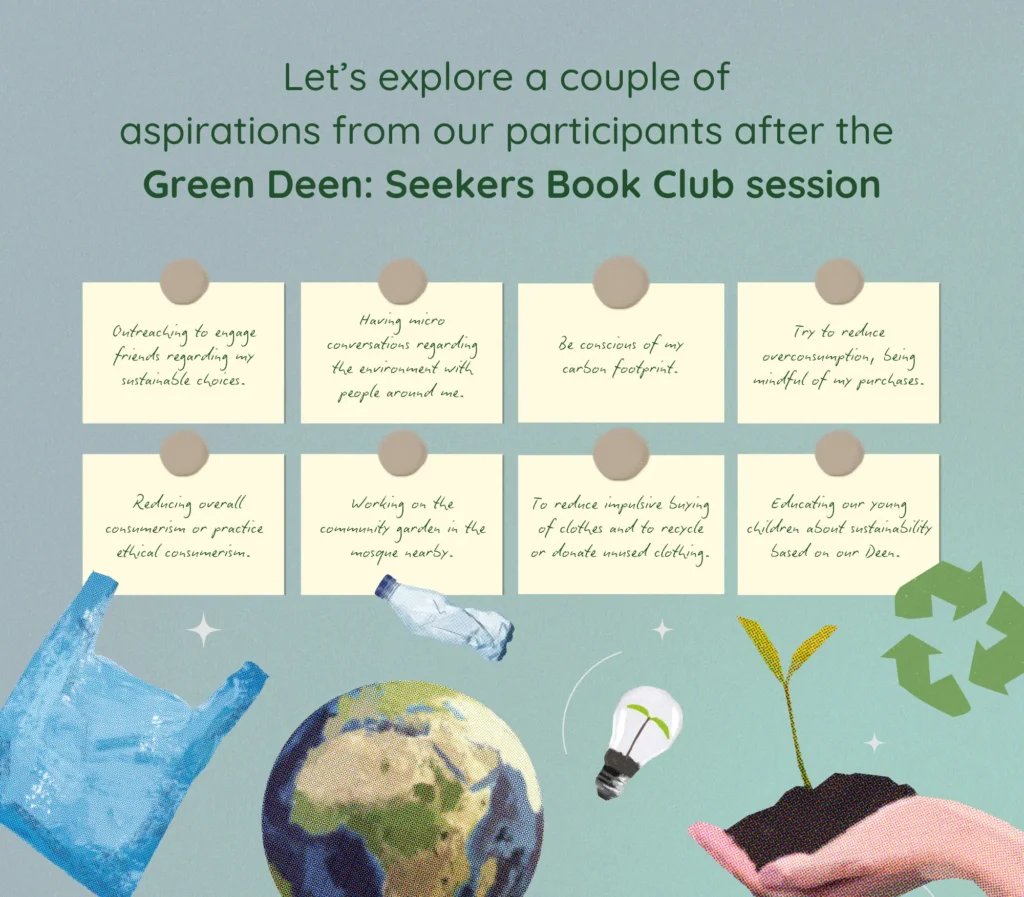In a world increasingly plagued by environmental crises, the urgency to reconnect with our natural surroundings and reevaluate our role as stewards of the Earth, khalifah fil ardh, has never been more critical. This sense of urgency, coupled with a deep-seated desire to root our environmental practices within the framework of Islamic teachings, inspired the recent session of The Seekers Book Club in August, jointly organized by Maktaba Books, Wardah, and FiTree (check out their IG here).
Green Deen: What Islam Teaches About Protecting the Planet by ibrahim abdul-matin*, was chosen for its novel exploration of the relationship between faith and environmentalism. Through reflective conversations and shared anecdotes, the book club session highlighted that true stewardship begins with inner reflection, as our ecological actions mirror our internal states. As the group unpacked key insights and shared personal commitments, we hope this article captures those moments and lays the foundation for future discussions, offering readers a glimpse into how living Green Deen can inspire and guide us toward a more sustainable and spiritually fulfilling way of life.
* ibrahim abdul-matin preferred to have his full name spelled in lowercase

The Earth is a mosque
The discussion, much like the book, explored early on the phrase referring to the Earth as a mosque and how it should be treated as such. Participants shared their reflections on how it does not just refer to the Earth being a place to pray but rather that it is also meant to be a place that we take care of and beautify. The same way that we would not litter or vandalize a mosque but instead do our part to clean it and leave it in a good state for others to use, we should also treat the Earth as such. This Earth, being a transitory resting place, might seem less important or crucial to our individual journeys in this transient life. Yet, it is part of the Amanah, or responsibility, that God has bestowed upon us as a home and place of shelter. Perhaps this is why we feel the most spiritually connected when we are out in nature, among the mountains or touching grass, as many participants shared.
The intrinsic value of creation due to its connection to Allah
In a similar manner, our bodies are also an Amanah bestowed to our souls as a home in this life. Incorporating a Green Deen into our lives starts from realizing the intrinsic value that the creation holds, simply due to its connection to the Creator. Being a creation of Allah in and of itself is a derivation of the value in us, and in all of the creation which adorns the Earth. Therefore, this journey towards Green Deen mandates that we start by taking care of ourselves and enter this journey with contemplation and introspection – much like how the Prophet, peace be upon him, used to retreat to the Cave of Hira as a place of self-reflection. There is a meaningful realization that it was these moments of internal reflection that paved the way for him to receive revelation and embrace Prophethood.
We do not need to create or consume to be relevant.
— Green Deen, page 32, nearing the end of the 2nd paragraph.
Start with our inner selves
Before we can start finding our place and our role in the world, it is necessary to assess our inner selves. What state do we find our inner selves to be in? If likened to a home, is it clean? Is it organized? Is it a happy place? The author describes a correlation between how we treat ourselves and the environment – treating ourselves well is a reflection of how we treat the environment and vice versa. In order to be an environmentally conscientious person, we have to start by being a conscientious person in the first place, and only then can we project it onto our work for the environment. As participants pointed out, this means we should be physically and mentally ready for the responsibility of taking care of ourselves, then the community and environment.
We must first acknowledge that we are just as much a part of nature as the animals that we care about, the mountains that we appreciate, and the trees that we find shade in. If we can reserve for our animals healthy and nutritious foods that are beneficial, revel in the sight of the mountains with love ,and water the trees hoping for it to grow, what stops us from doing the same for ourselves? It is worth thinking about, according to participants, what more we could achieve if humans were treated as a sacred part of nature to be nurtured and cared for instead of machines in a factory production line to fill the pockets of the rich under the guise of capitalism.

Then extend it to others
Once we learn to responsibly take care of ourselves better and view humans as part of the nature that we are entrusted with, we can then build better connections with others and form a community that can bring about the change that we crave to see in the world. We often feel overwhelmed when we think about how much one person can do to bring about positive change. And yet the same feeling turns into inspiration when we have a whole community of individuals mobilizing their collective resources instead. Each individual brings a unique set of skills to the table and connects to the cause in different ways. While some participants view environmentalism as a part of their sacred duty towards Allah The Almighty, others find it to be a means to strengthen their spiritual connection with Allah The Almighty. Even in the same household, one might be more conscious about saving water but struggle with ethical consumerism, while another might use more water and yet rarely spend on material products that might not be ethically produced.
Remember to meet people where they are
When we accept that different people might connect to a cause in different ways, it is easier for us to approach the conversation with our friends and family in a way that appeals uniquely to them. One of the participants shared that more often than not, people disconnect from the topic of climate change because the way they are talked to doesn’t strike their heart enough to drive them towards action. In the same way that Da’wah has to take into account the condition of the person that it is directed towards, so does the invitation of impact-makers into the circle of change. Some suggestions made by participants on making positive change include having open and respectful conversations about the things that we do, trying to understand the intentions of and decisions made by others as well as building communities and sharing stories.
Sharing green stories can make an impact
Sharing stories, especially across generations, can have a profound impact on the ways that Green Deen can be practised. Overconsumption, waste, overindulgence, and shortage of resources are issues being exacerbated by the recent generations with the advent of and an increasing reliance on industrialization. We can find many examples from our grandparents’ and ancestors’ lifestyles that showed they were living in harmony with nature and the world around them. A participant talked about how architecture used to take into account the conditions of the soil, unique properties of different materials to bring about an intended purpose, and its cultural meaning when building.
From observing the practices of our grandparents, we see a deep-rooted mindset of resourcefulness, where almost everything had a purpose, and can be repurposed, with nothing wasted. It was not just about minimizing waste, but about cultivating a habit of thoughtful reuse and making the most of what was available – unwearable clothing can be repurposed as kain buruk (cleaning rags), spent tea leaves and egg shells can be recycled as fertilizer and butter cookie tins can universally be reused as a sewing kit box (you know what I’m talking about). In the Nusantara region, coconut leaves are weaved to make ketupat (rice cakes), but the stems of the frond are used to make sapu lidi (stiff broomsticks) instead of being thrown away. The long-lasting effects of colonization, coupled with globalization and industrialization, have contributed to the misperception that the Global South is solely responsible for landfills and improper waste management. This overlooks the region’s rich history of resourceful practices and sustainable living, which were disrupted by external influences over time.
You can start to action today by simply setting a small goal
We can help each other understand the importance of mindful living by reconnecting with these values and sharing our own experiences. Participants were asked to share their goals at the end of the session, and here are some of them:
- Reduce overall consumerism or practice ethical consumerism
- Be more intentional about what and how much we put in our bodies by reducing unhealthy food consumption
- Educate children and incorporate good habits to teach them about Green Deen
- Give back to the community and increase self-reliance through gardening
- Converse with others about our own efforts and encourage them to increase in theirs
- Get involved with more organizations and community initiatives

Although there are many people and existing practices that promote Green Deen, there is always more that we can do. Spaces like our book club and collaborations with FiTree such as this, offer opportunities to connect with like-minded people, explore new ways to implement positive change, and hold each other accountable. It’s through these shared efforts that we can inspire action and collectively move towards a more mindful and sustainable future
Credits for this article:
- Written by Marsiat Jahan
- Edited by Safiah N from FiTree
- Infographics by Sitti Hatta

Pingback: Talking about Prophetic Healing at a Book Club - Notes
Comments are closed.